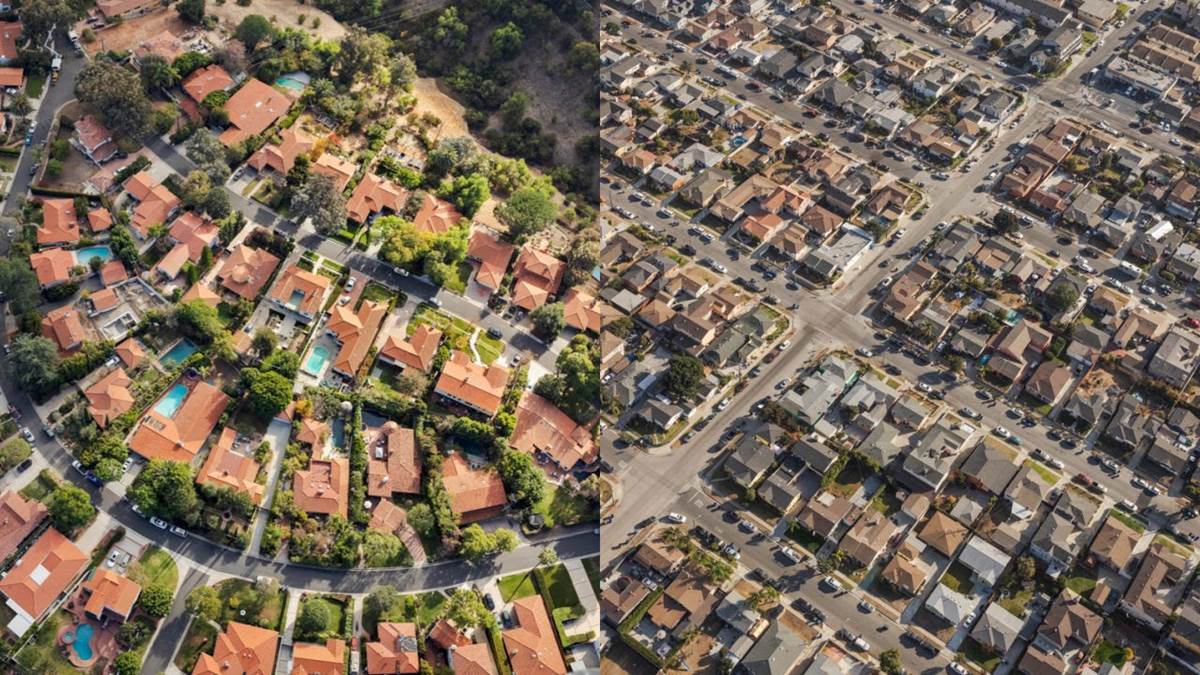Season 7 of Overheard at National Geographic kicked off this week with an episode titled “Cooling Cities By Throwing Shade.” Who knew that trees could be so political? Hosted by senior podcast editor at National Geographic Eli Chen, this season premiere includes four special guests who take listeners through the history of the problem and what people can do to fix it.

Left: Most shade in L.A. is in communities such as Rolling Hills, where people can afford to care for the trees.
Right: In low-income, largely minority areas such as Hawthorne, lack of public investment means fewer trees.
Photograph by Elliot Ross.
It’s been a hot summer, including in places that don’t typically get that hot, like Portland and Seattle. More people die from heat stress annually than the average number of deaths per natural disaster. Major cities tend to be even hotter, with asphalt and building materials trapping heat. The best refuge from the heat is trees, which not only provide shade, but also make the air fresher and add moisture to it, which cools the surrounding temperature down. The only problem is, in most major cities, you only really find them in the wealthier areas.
This episode looks at Los Angeles as a case study, with National Geographic writer Alejandra Borunda tracking the history of the region to find out exactly why a fifth of the city’s trees are located in an area where the wealthiest 1% of the city’s population lives. Traversing Vermont Avenue from South Central L.A. to Los Feliz, she watched the landscape change from virtually no trees to a canopy of greenery so dense that only 40% of the sky could be seen.
It all started during the Great Depression when President Roosevelt created the Home Owners’ Loan Corporation, designed to make home loans easier to help families stay in their homes. Neighborhoods were appraised in over 150 cities and lines were drawn on maps with a grading scale. Done at a time when segregation was legal, the grading scale was biased, giving a higher grade to areas with predominantly white residents and a lower scale to areas with people of color. As a result, parks weren’t added to these locations and industrial facilities and roadways were placed in these zones. Known as redlined neighborhoods, temperature measurements today reveal that they are typically hotter than other parts of the same city… And they have a lot less trees.
Money doesn’t grow on trees, but trees do grow on money. In low-income areas where funds are desperately needed elsewhere, the budget typically isn’t there to water and maintain public trees. Enter a few environmental heroes that are working hard to counteract this. Eileen Garcia is an environmentalist in L.A. who grew up in La Puente with her grandparents, who brought fruiting trees with them from Mexico and planted them in their backyard. She’s now the regional manager in southeast L.A. for TreePeople, an environmental nonprofit working to plant more trees in L.A. Driving around with a truck that has a 15 gallon water tank, she cares for and maintains these recent plantings to help them grow and provide the shade and heat relief these areas badly need.
The city of Los Angeles has a goal of planting 90,000 trees by the end of 2021. The long term goal is that by 2028, these neglected neighborhoods will have a tree canopy cover of over 50%. This will not only save lives from heat stress, but also save air conditioning costs because the buildings will already be cooler. In the meantime, the city is also working to redesign bus shelters and public infrastructure to increase the amount of shade available throughout the city.
Maybe throwing shade isn’t such a bad thing, after all? The episode includes a peek at another city with a similar initiative, St. Louis. Rebecca Hankins is the partnerships coordinator for a nonprofit tree nursery called Forest ReLeaf, which recently saw an increase in funding to help with the upkeep of trees in the city and assistance to homeowners with trees.
You can listen to this full episode and others at the official Overheard at National Geographic website.
